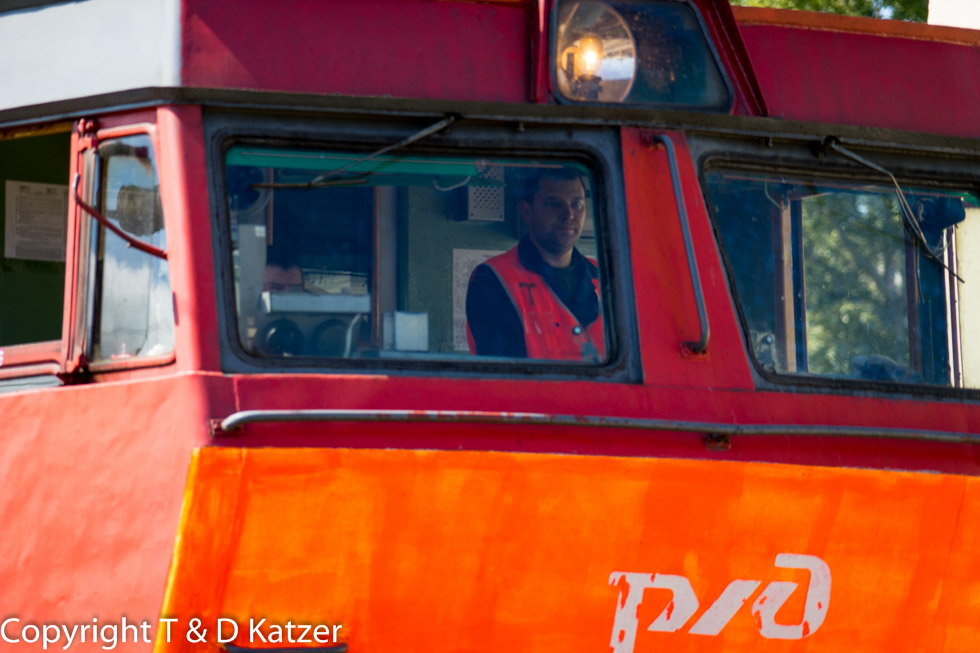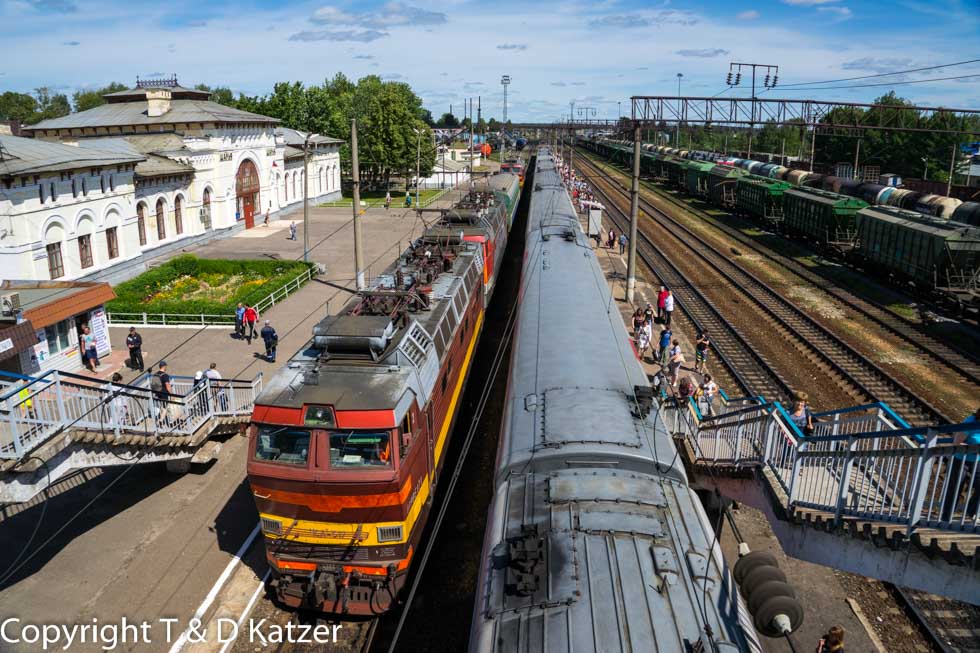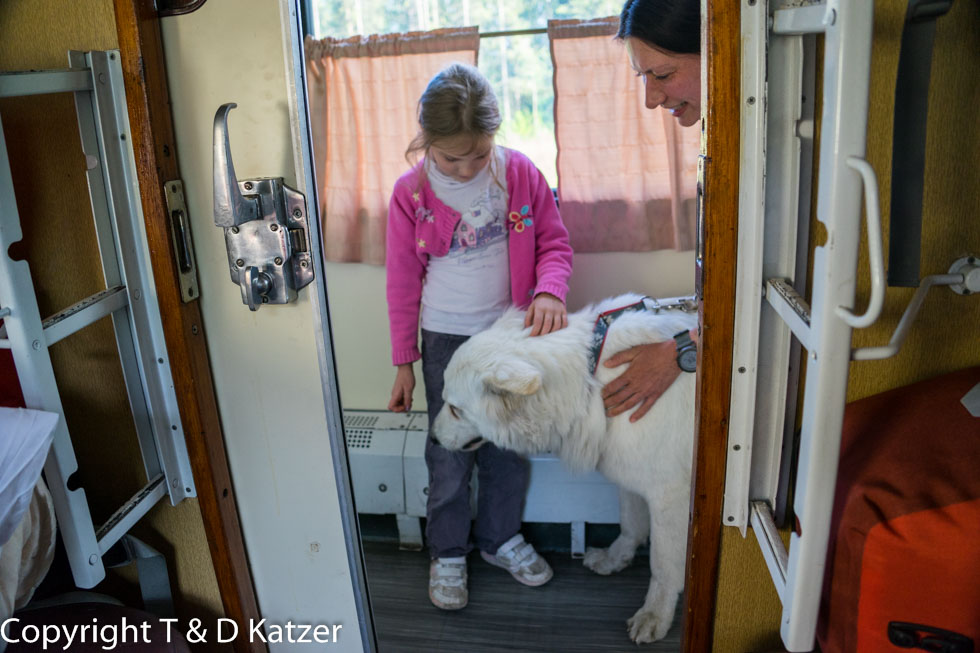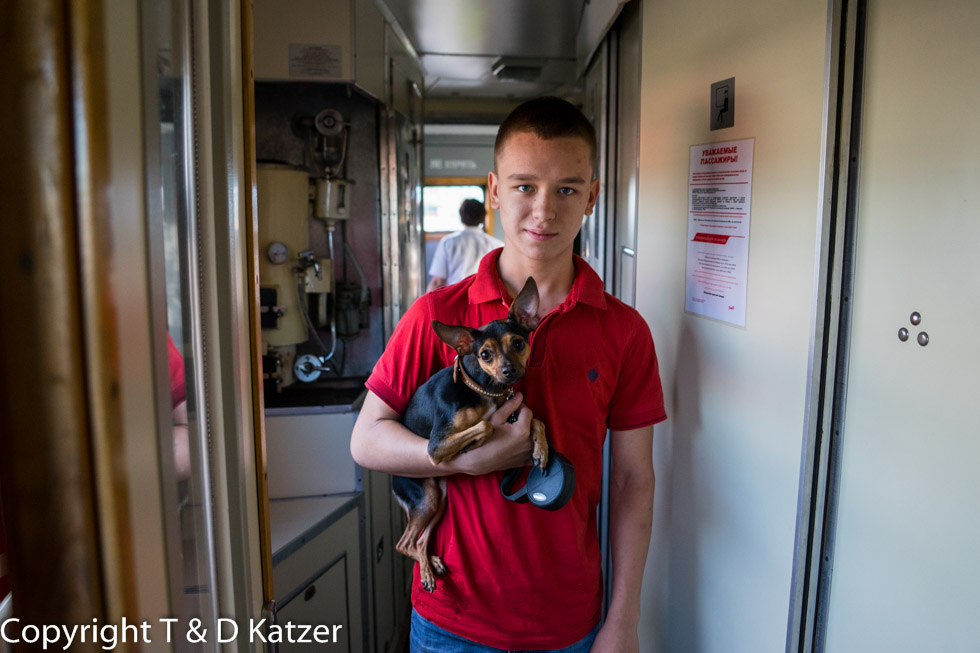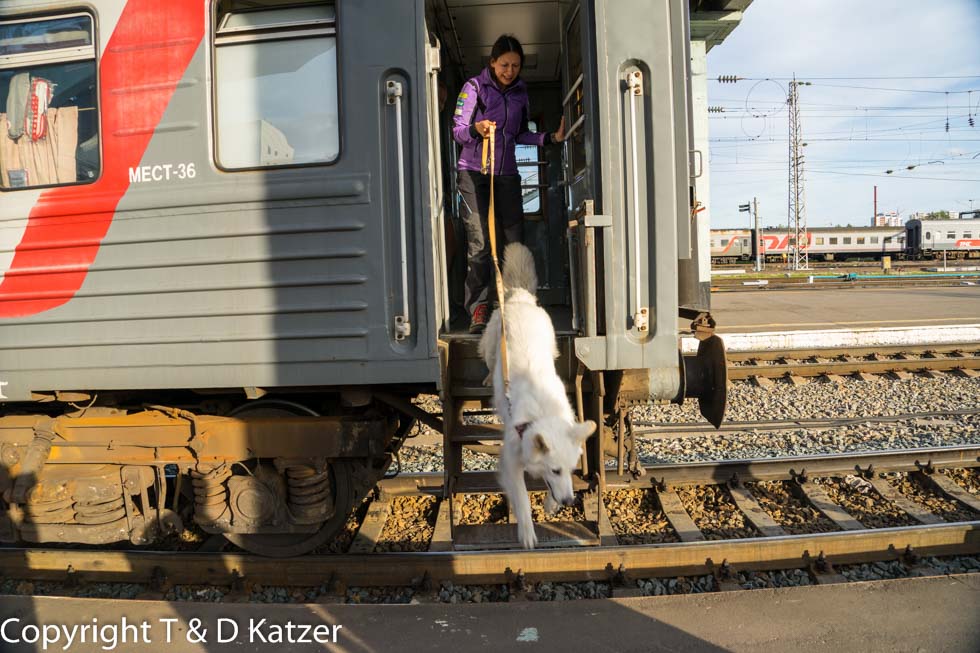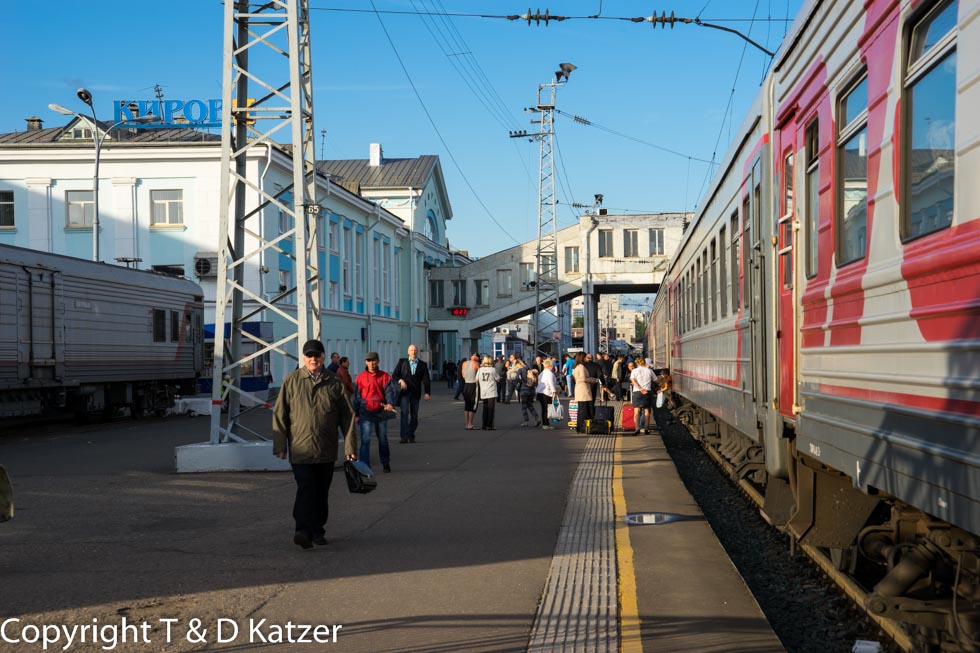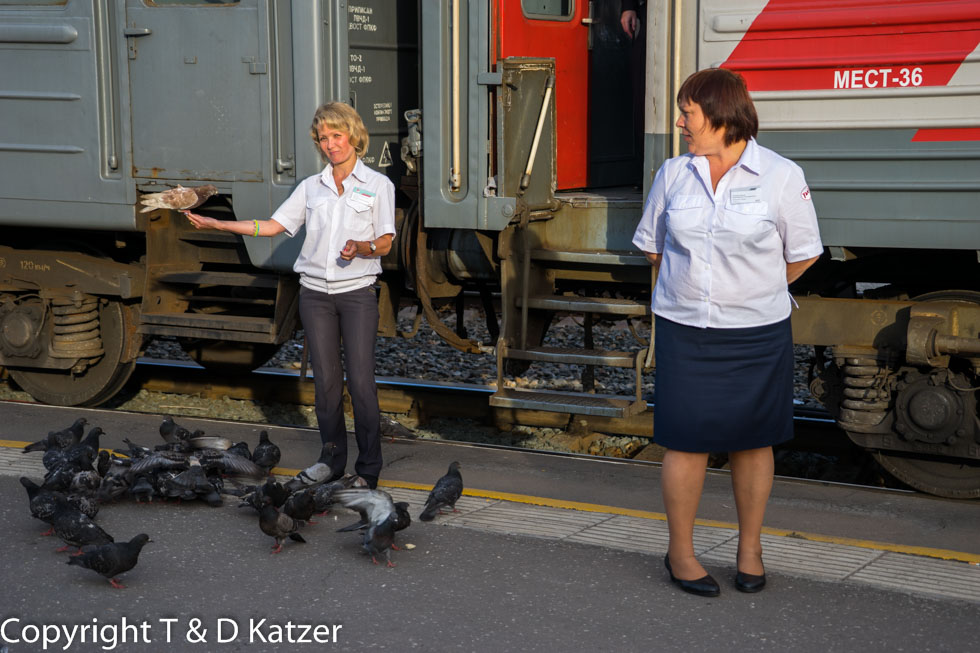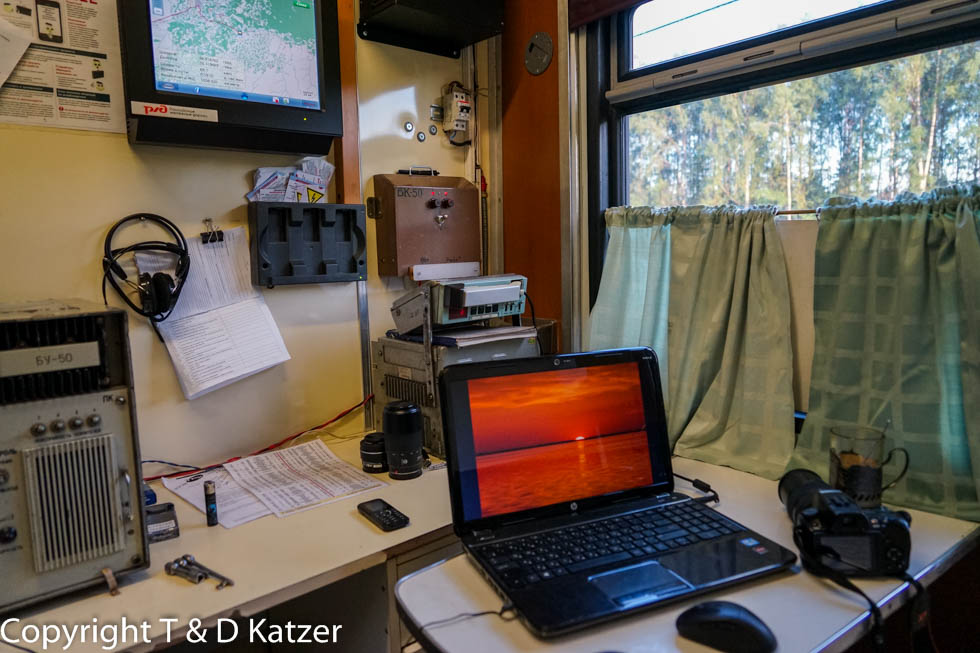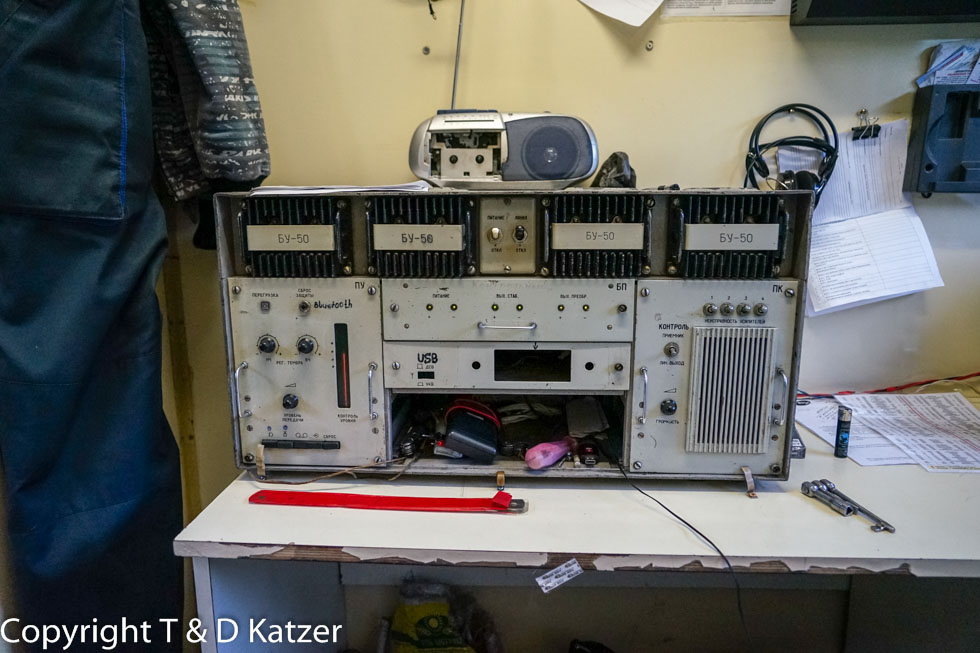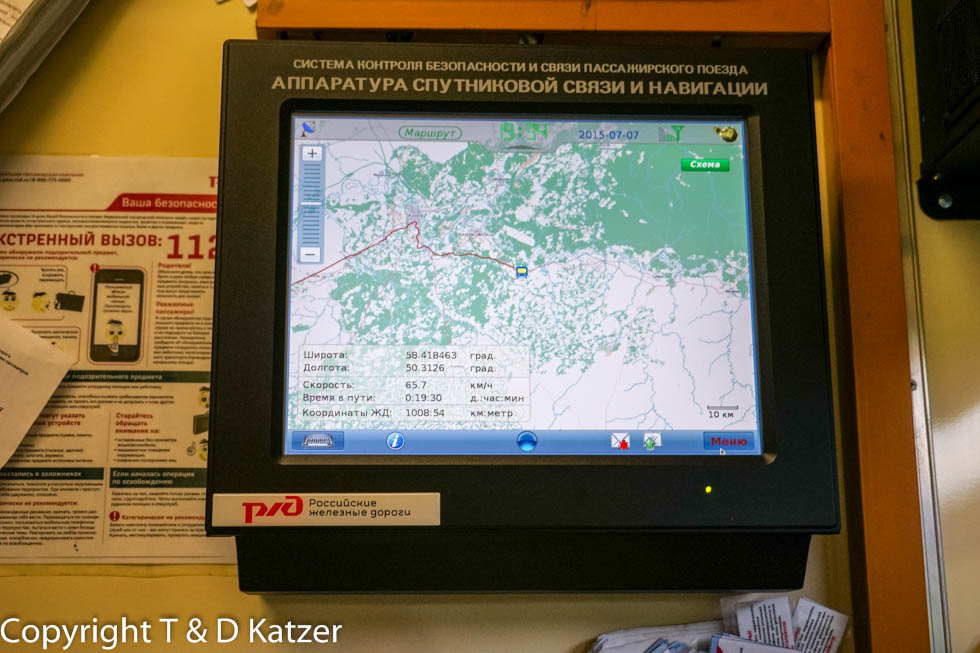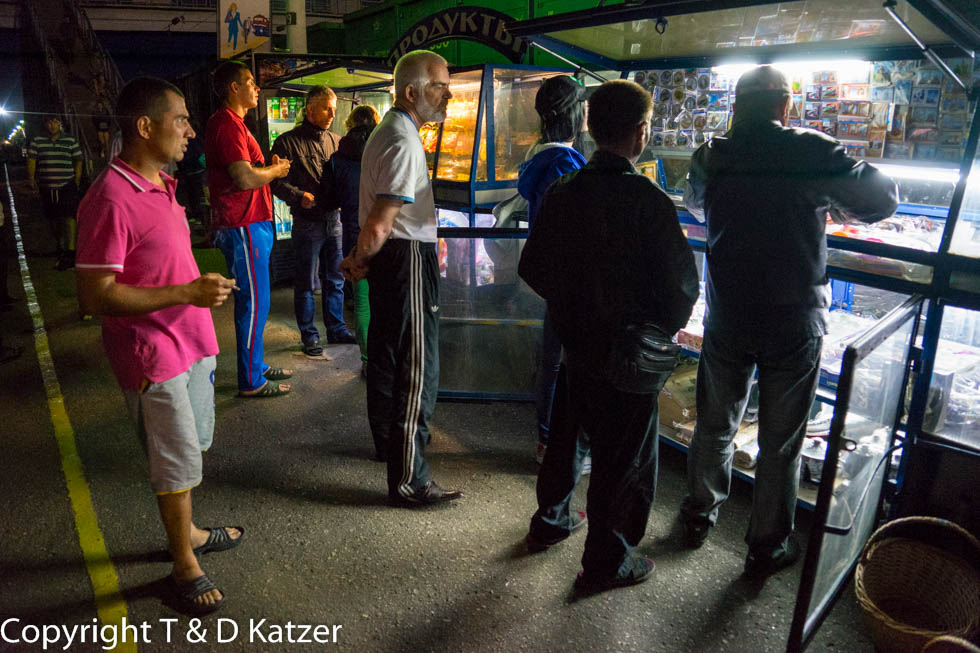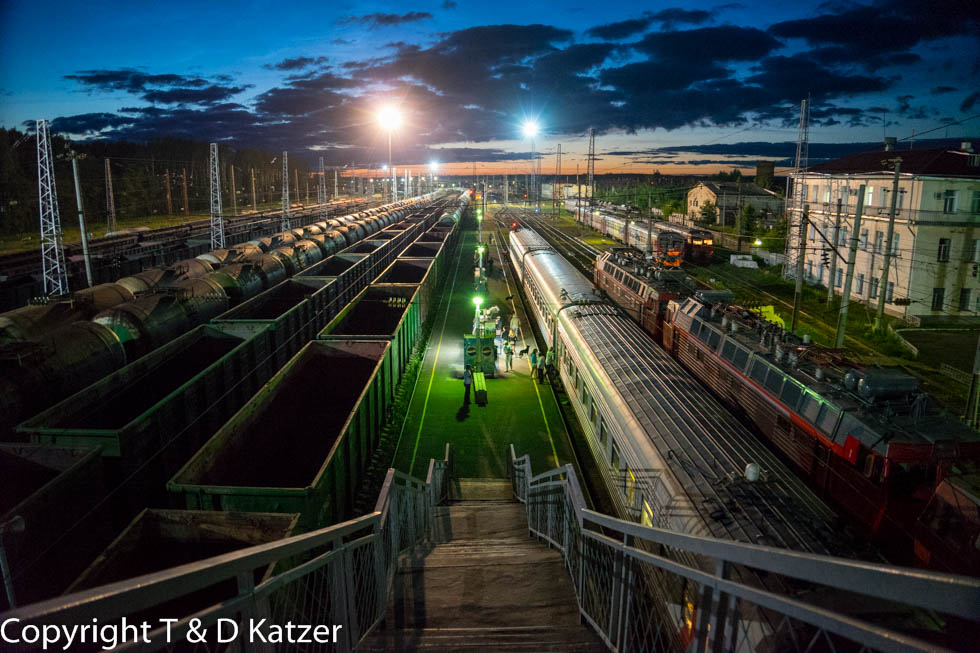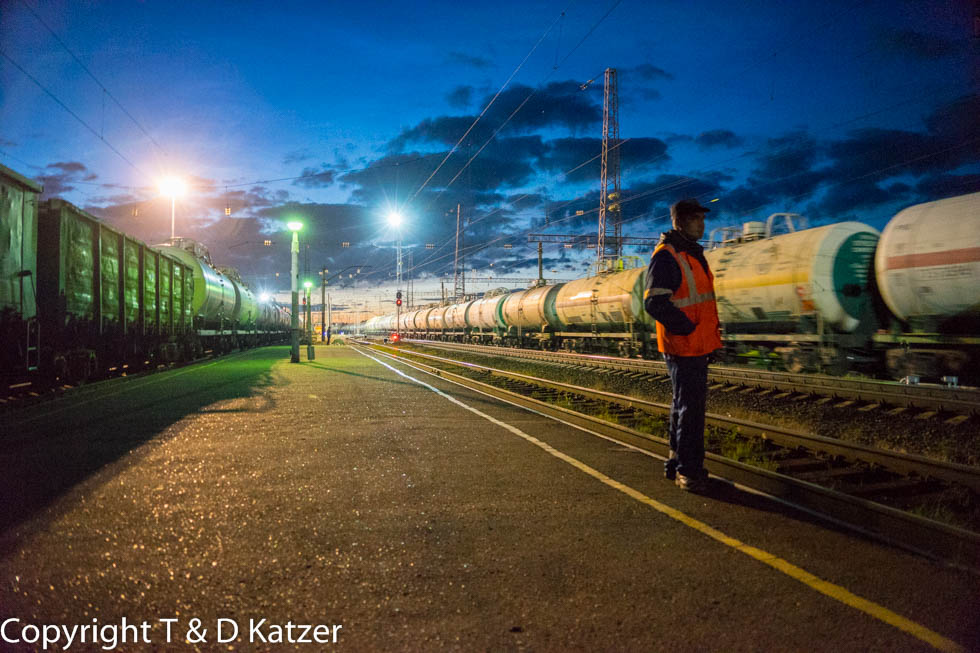
The merciless
N 57°58'23.1'' E 53°0'18.9''
Day:
10
Russia
Place:
Balezino
Daily kilometers:
1,214
Total kilometers:
3,526
Latitude N:
57°58’23.1”
Longitude E:
053°0’18.9”
(Photos of the diary entry can be found at the end of the text).
LINK TO THE ITINERARY
It is already 23:45 and nobody knows which track the train will arrive on. We look nervously at our watches because the Russians usually keep to the correct departure time, even if the train arrives late. They simply make up for lost time. For us, however, this means more stress, because we have less time to get our luggage into the compartment.
24:00. Our overpriced porters are waiting in the starting blocks on track two. They have already loaded the boxes and trailers onto their two large luggage trolleys. Crowds of people stream onto the embankment, although the display does not yet show a track.
24:05. Now the running and pushing begins. Two bright lights bite their way onto track two in the dead-end station. The 044 puffs in with its many wagons in tow. Hooray, for the first time on this entire journey we are standing in the right section of track. While Tanja and Ajaci look after our equipment trolleys, I accompany our baggage handlers to railroad carriage nine. I show a carriage attendant the four luggage tickets. She says something in Russian, which I don’t understand, and puts the tickets in a folder while our porters make the two large boxes and the two trailers disappear inside the train. I let the boys do their job and hurry to Tanja to push our two luggage trolleys to carriage 11. He is directly behind the groaning tractor unit, which is making strange noises. “Stop!” says a conductor as I hand her the four tickets for compartment six. “Where’s the dog ticket?” “Dog license? We don’t need it. We have four tickets for two people,” Tanja and I say. The officer simply leaves us standing there and wants to find out from the train manager. Meanwhile, we want to get our saddlebags into the iron tube, but we are stopped again by a railroad employee. “You need a dog ticket,” he says in a calm tone. This is when Tanja reacts angrily for the first time and is about to make a mess of the conductor. “We have four tickets! Four tickets! Do you understand? Four tickets for two people! That’s more than enough!” “Tanja! It’s not his fault. Stay calm. The situation will come to a head otherwise,” I try to calm her down. “Enough is enough. They’re all crazy.” “That may be true, but we have to stay calm,” I reply. “That’s okay. I’ll stay calm!” she replies with muted anger. “No, you’re not allowed on. Your train left six hours ago,” says a conductor next to us to a Mongolian woman who is on the verge of tears. “You’ve missed your train and have to buy a new ticket,” we hear and are glad that we don’t have to suffer the same fate as this poor woman. She apparently got the time wrong because of the many time zones that exist in Russia. Then the officer comes back and says: “You can take your dog with you. That’s no problem.” “There you go,” says Tanja and storms into the Transsib with four saddlebags. We immediately stow our equipment under the beds and in the compartments next to the upper bunk beds. Everything fits in perfectly, so we have more than enough space for the next five nights and four days. And this despite the fact that we canceled an entire compartment.
When the train departs late, we can hardly believe our luck. “We have made it! Hurray we made it! We’re on the legendary Trans-Siberian Railway with all our e-bike equipment! Hooray!” we both shout and are as happy as little children when suddenly there’s a knock at the door. The cheerfulness falls from our faces in shock. “Have they thought of something again?” I ask Tanja. “I’m the train manager. My name is Ludmilla. Your boxes are too big. You have to unpack what’s inside. Would you please follow me,” she says in a friendly but very firm tone. “Gladly,” I reply, grab my multitool and follow her to carriage number 11. To my amazement, there is no luggage trolley at all. The baggage of travelers is stuffed into a normal four-man compartment. One of our boxes is wedged between the ceiling and the top bunk bed and rests there perfectly. The other is on the floor between the two lower beds and many pockets. It is also passably accommodated. “And what should I do? Everything looks pretty good,” I ask. “You have to take out what’s in the boxes. Please!” “Uh, why?” “Because the boxes are too big.” “But everything fits as it is.” “Never mind, the boxes are too big.” “There are bikes in there. Even if I wanted to, I couldn’t get them out of there. It’s impossible to manage. I can’t maneuver the heavy box down from up there. How is that supposed to work?” “Never mind, get your bikes out of the boxes. They’re too big.” “I can’t do that. We’d have to empty the whole compartment and even then, no single man would be able to heave the box down there.” “Take the wheels out of the box!!!” “How?” “Take the wheels out of there!” “How!? How!? How!? How!?”, I soon ask desperately and loudly. “No! No! No! No! No!” she now replies, also excited and in a loud voice. “I can’t get the damn boxes down there!” “I’m a policeman and I’ll throw them off the train!!!”, the needless threat suddenly hammers in my ears and what I warned Tanja about just a few minutes ago has happened. The train manager turns on her heel and unexpectedly leaves me alone. Is this a good or a bad sign? I have no idea. Now really desperate, I stand in front of the compartment door and stare hypnotized at the unsolvable task. I try the delaying tactic and hope that the train manager will see reason with me after all. Then she comes rolling back down the long, narrow corridor with a serious expression. “Cut up the boxes!” she says adamantly. “How? How am I supposed to do that?” “No! No! No,” is her stoic reply. When she storms off again, I want to fly off the handle with rage or beat something up terribly. I take my multitool, squeeze myself as best I can between the luggage and bags of my fellow travelers and start cutting open the bottom box. Be careful not to accidentally damage one of the brake or gearshift cables in the excitement. With a lot of effort, I manage to free the e-bike from its protective sheathing. Then the fucking box gets stuck between the compartment and the aisle. Now giving free rein to my rage, I kick the thing until it finally gives way and wraps itself completely demolished around the entrance to the compartment. The Gnadelose storms past again and casts a snide but satisfied glance at the destroyed pack. Then she points upwards and says: “Unpack!” “Please at least leave the box up there. It fits very well and doesn’t bother anyone.” “It’s too big. If my boss sees it, he’ll wring my neck,” she replies. “But I can’t get it down there. I don’t have enough strength,” I say, pointing to my biceps to make this unmistakably clear. The full-figured lady looks at me disparagingly from top to bottom. As if to say “What a wimp you are” and disappears again. It doesn’t take long for her to get a Russian passenger to help me. Now we are both faced with the soon unsolvable problem of getting the wedged box down without destroying the wheel at the bottom. It is now 2:00 in the morning. In the last 48 hours, we’ve driven from Nuremberg to Berlin in monkey heat, after a short night, we’ve loaded our belongings onto the Paris-Moscow train with superhuman effort, after a 24-hour train journey we’ve spent eight hours at the station in Moscow, where we’ve spent many exhausting hours exchanging tickets and so on. I stand there and start to curse the whole journey. Especially some Russian officials who are really good at being merciless.
Using our combined strength, we lever the 180 cm long and approx. 40 kg heavy cardboard box off the bunk bed. We’ve almost made it when he gets out of our way and crashes onto the bottom wheel. Because the already unpacked e-bike with the front tires removed is only standing with the wheel suspension on the ground, the mudguard bracket breaks off quite unspectacularly. My helper looks at me and shrugs his shoulders. Collateral damage is what his gaze seems to say. In the meantime, I can only pray that our bikes are not irreparably damaged on arrival. I have a lot of spare parts with me, but they are certainly not enough to repair accident damage or the consequences of such brute force. We agree to heave the box back up, put the lower wheel with all the luggage in the gear and then try again. In this way, we can record a success after 30 minutes. Both bikes now squeeze between the beds and the luggage next to each other. In the meantime, one of the train manager’s subordinates is checking on things. When she sees the bikes standing there unpacked, she says: “Dismantle! Dismantle your bikes immediately. They’re bigger than allowed.” This is the time when I could become a criminal. I look at the obviously imbecile with fierce eyes. “How am I supposed to dismantle the wheels?” I ask in a controlled tone of voice. “As you can see, you have to unscrew this screw and fold up the wheel,” she says with a confidence that few people display. “This is not a folding bike. It has a rigid frame. If I open this screw, the main shock will fall out,” I tell her using sign language and all the Russian I can think of at this exciting moment. “Never mind. The wheels have to be dismantled!” she yells at me. “I don’t have any tools,” I try to save myself. “No tools?” she says, smiling a little wickedly and returning a little later with a toolbox containing a broken wooden file, a fat, worn-out screwdriver that is more suitable for dismantling monorail wagons than high-tech bicycles and lots of other useless stuff. “Here are some tools. Take your bikes apart.” “I can’t do that!” I say desperately and come to the conclusion that they are trying to finish me off by any means necessary. “It’s fine the way it is,” I say and simply leave the dragon to go back to our compartment. I curse uncontrollably to myself and tell Tanja about the idiotic action. “I don’t know whether the ladies are now trying to open any screws themselves or are cutting brake lines in revenge for me leaving,” I say at the end of my tether. “They won’t do that. I’m quite sure they won’t,” says Tanja when there’s a knock and the conductor, whom Tanja had initially scowled at, is standing at the door. “Sit still Denis. I’ll sort it out,” she says and disappears with the man. “You’ll have to dismantle the bikes further. They’re too big,” the boss’s helper says to her again. Tanja takes her hand in hers, looks her in the eye and says: “You know, we have a long journey behind us and ahead of us. We’re athletes and ride our bikes around the world. My husband is a writer and writes books about these journeys. He writes about the friendship between Russia and Germany. If we continue to dismantle the bikes, they will be broken. That hurts my heart. Please leave the bikes as they are now.” “And what about the solar panels? Can we put them upstairs?” “I’ll take them into the compartment. But that’s all right now?” The helper nods. Tanja returns to the compartment and reports on her success. “I hope that’s really good now,” I moan. “I’m sure of it. Now they won’t bother us any more,” Tanja is convinced, whereupon we lock the compartment door and crawl into our bunk beds.
Ta ta tock, Ta ta tock, Ta ta tock, the wagons of the Trans-Siberian Railway have been rattling for almost eight hours now across the iron ribbon that connects Moscow with the distant Sea of Japan, a marginal sea of the Pacific Ocean. Tired, I look out of the window, past the typical Russian wooden houses with their small gardens, and think of the tens of thousands of workers who lost their lives building this line. Since work began in 1891, 30,000 workers have been employed. It is estimated that up to 90,000 people were working on some sections of the track at the same time. Allegedly, the government at the time also brought in forced laborers and exiles to carry out dangerous blasting work for tunnel construction. Many of them were crushed by stones and buried under landslides. The extremely hard daily life, the lack of medical care and the disregard for basic sanitary conditions were responsible for the deaths of many workers who came from China, Korea, Japan, Siberia and even Italy.
I’m glad that the train manager and her fanatical subordinates have left us alone so far. It looks like they’ve finally come to terms with our bikes. “Did you sleep well?” I ask Tanja, who is lying next to me on her bed and yawning loudly. “Like unconscious,” she replies, yawning again. “Did you know that the Russian words for railroad, shelesnaja doroga, mean iron road? In the deeper sense of these words, you can really feel how incredibly hard it was to build a 9,288 km long railroad line across seven time zones through endless forests, swamps, river plains and over mountain ranges. Especially over the permafrost, which is in constant motion due to the temperature differences from summer to winter,” I say thoughtfully. “No, I didn’t know that. And you? How do you know that?” “I read it,” I reply, dangling my legs over the edge of the bed. Ajaci looks up at us. “A great dog. He held out really well and didn’t whine. It’s about time we made a longer stop so I can take him for a walk,” says Tanja and grabs the map showing all the stops and the length of each stop. “Oh Ajaci, you can get out right away. In ten minutes we’ll be stopping in the city of Kostroma,” she says, climbing out of bed and getting dressed. Still exhausted from the exhausting night, I follow her. As soon as I get off the train, the train manager comes to meet me. My heart is already in my mouth as she greets me in such a friendly manner as if nothing had ever happened. “What’s your dog’s name?” she asks Tanja. “Ajaci.” “Ah, Ajacerju. What a beautiful name for such a beautiful dog. Come here, my dear Ajacerju,” she says, but Ajaci gives her the cold shoulder and hides behind Tanja. “Come over here. What a beautiful dog you are,” she gushes and tries to stroke him. Other passengers also come and want to stroke Ajaci and be photographed with him. After the pleasant and unexpected turnaround, the train manager greets us at every opportunity with a personal handshake or a friendly wave. Ajaci in particular, who has undoubtedly mutated into a superstar in a very short space of time, is her absolute favorite. He is constantly making new friends. But not only people and their enthusiastic children, but also their animal friends such as cats and dogs of all sizes and the most bizarre breeds. It certainly wasn’t a mistake to make the effort to take Ajaci with us on the upcoming big e-bike tour.
The live coverage is supported by the companiesGesat GmbH: www.gesat.com and roda computer GmbH www.roda-computer.com The satellite telephone Explorer 300 from Gesat and the rugged notebook Pegasus RP9 from Roda are the pillars of the transmission.
